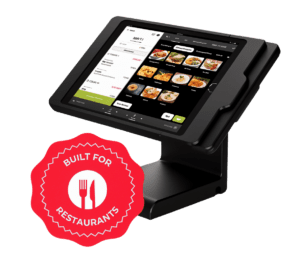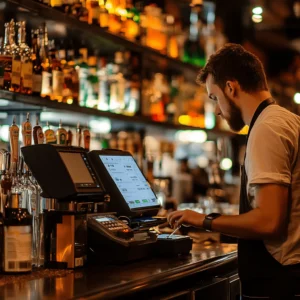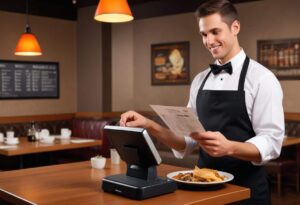In the fast-paced world of modern hospitality, a reliable bar restaurant POS system stands as a critical component for efficient operations. These systems streamline transactions, manage inventory, and enhance customer experiences by integrating various operational aspects into one seamless solution. Choosing the right POS system can significantly impact your business’s success. However, navigating through countless options and features can be overwhelming. Without careful consideration, you risk making costly errors that could derail your efforts.

Avoid common mistakes in POS implementation by prioritizing key steps during the selection process. We recommend focusing on assessing your specific business needs, ensuring adequate staff training, and understanding the total cost implications. Many bar and restaurant owners overlook these aspects and suffer from inefficient workflows and increased operational costs as a result. By carefully considering every element involved in choosing a new POS system, you set your business up for smooth operations and long-term success.
Prepare to explore each potential pitfall associated with adopting bar restaurant pos systems as we guide you through avoiding common mistakes in pos implementation. From integration issues to underestimating expenses or neglecting user training, each section provides actionable insights designed for immediate application. Armed with this knowledge, make informed decisions that will optimize both the efficiency of your operations now and their scalability in future growth endeavors.
Failing to Assess Business Needs
Understanding the specific requirements of your bar or restaurant is crucial in selecting an appropriate POS system. Each establishment operates differently and has unique demands for processing orders, payments, and managing customer service. Bar restaurant POS systems should cater specifically to your layout, menu offerings, and peak busy times. For instance, a sports bar with high traffic during game nights may benefit from a system that excels in fast-paced order management. In contrast, a fine dining restaurant might require advanced reservation capabilities alongside seamless course tracking.
Analyzing current operations is vital in identifying areas ripe for improvement before adopting new technology. Conduct thorough evaluations of daily workflows to discover bottlenecks or inefficiencies you aim to resolve with a new point-of-sale system. What tasks are staff spending unnecessary time on? Where do delays typically occur? Identifying these points can pinpoint features that will enhance productivity and streamline processes. Employing such analysis helps avoid common restaurant technology pitfalls by ensuring every aspect of your operation aligns smoothly with the new system.
Scalability is another important factor when choosing a suitable POS system for your bar or restaurant. Businesses often evolve over time—seasons change the number of customers served, menu offerings expand or adapt according to demand, and operations outgrow initial footprints. Failure to anticipate future growth remains one of the avoidable pitfalls in POS systems selection. Choose platforms that accommodate expansion effortlessly without incurring additional costs or requiring comprehensive overhauls in infrastructure. Opt for flexible solutions designed to scale as business needs grow; this saves time and money down the line while supporting sustainable growth initiatives effectively.
Ignoring Employee Training
Proper employee training is essential for a smooth and efficient POS transition. A comprehensive training program ensures that all staff members can confidently navigate the new system, enhancing operational efficiency. Without adequate preparation, employees may struggle with the technology during peak service hours, leading to delays and decreased customer satisfaction. Comprehensive instruction mitigates these risks by equipping staff with the knowledge to handle the system’s various functionalities.
Common pitfalls often arise when businesses underestimate the importance of thorough training. Relying solely on vendor-provided manuals or neglecting to schedule dedicated training sessions can leave staff ill-prepared. This oversight can result in frequent mistakes, increased transaction times, and erroneous data entries. Such issues not only hinder daily operations but also negatively impact revenue and tip levels—crucial aspects of any bar or restaurant’s success.
To ensure effective usage of your new POS system, consider best practices for restaurant POS implementation by conducting structured training sessions tailored to different roles within your organization. Break down training into manageable modules focusing on specific tasks like order processing, inventory management, and payment handling. Incorporate practical hands-on exercises where staff simulate real-world scenarios they might encounter during their shifts. Additionally, maintain continuous support by designating certain team members as super-users who can provide ongoing assistance and reinforce learning post-rollout.
Scheduled refresher courses help sustain proficiency over time while accommodating new hires seamlessly into your workforce. Foster an open environment where employees feel comfortable providing feedback on their experiences using the new POS system; this dialogue aids in identifying areas needing further clarification or improvement after initial deployment phases. By prioritizing excellent employee training, businesses empower their teams to leverage advanced POS solutions effectively—enhancing overall productivity and output without compromising service standards.
Underestimating Total Costs
Many bar and restaurant owners make the mistake of focusing solely on the upfront cost of a POS system. While it might seem financially prudent to opt for the cheapest option initially, neglecting the hidden costs can lead to budgetary headaches down the line. Beyond the initial purchase price, consider factors such as licensing fees, hardware upgrades, and additional peripherals required for seamless software integration. Overlooking these aspects can significantly drive up your operational expenses over time.
Budget planning should account not only for these hidden expenses but also for ongoing costs related to software updates and maintenance. Regular updates are critical to optimizing bar operations with tech by ensuring that your system remains secure and runs efficiently. Maintenance agreements often incur annual fees, which may not be apparent at first glance. Additionally, transaction fees can vary based on your provider and payment processing volumes; thus they need careful consideration as they directly impact profitability.
Evaluating long-term expenses against immediate savings is crucial in making an informed decision about bar restaurant POS systems. A system offering initial cost savings but requiring frequent costly updates or high transaction fees can erode profit margins quickly. Conversely, investing somewhat more upfront in a reliable POS system with lower ongoing costs can result in better financial health over time. Assess long-term commitments carefully by comparing different vendors’ fee structures and service level agreements.
Disregarding Customer Support Options
Reliable customer service from your POS provider plays a crucial role in the smooth operation of your bar or restaurant. Without it, even the most sophisticated system can falter and lead to significant disruptions during peak hours. Establishing good lines of communication with your provider ensures that technical issues are swiftly resolved, minimizing downtime and maintaining customer satisfaction. Providers who offer dedicated support channels like 24/7 hotlines or live chat facilitate quick assistance when you need it most, ensuring uninterrupted service.
Consider response times and support availability when selecting a POS system. Look for providers who guarantee rapid resolution times for both minor glitches and major outages. An easily accessible support team is essential not only for addressing immediate concerns but also for offering guidance on staff training on new systems. This approach keeps every team member up-to-date on operational procedures and effectively manages customer data securely, enhancing overall efficiency within your establishment.
Neglecting to evaluate the quality of customer support can lead to severe setbacks, as demonstrated by real-world case studies. For instance, a busy downtown bar experienced a multi-hour delay processing transactions due to their POS provider’s lack of timely assistance during a software glitch. This bottleneck not only frustrated patrons but also resulted in substantial revenue loss as customers were forced to seek alternatives. Such scenarios underscore the importance of choosing solutions with robust customer support structures to uphold seamless operation and maintain loyalty among clientele.
Choosing Features Over Usability
In the pursuit of advanced functionality, many bar and restaurant owners fall into the trap of prioritizing features over usability in their POS systems. While sophisticated features can seem appealing, they often complicate day-to-day operations if not paired with a user-friendly interface. It’s crucial to select a system that achieves a balance between complexity and ease of use. A crowded display or convoluted menu system can overwhelm staff during peak hours, leading to slower service and increased errors. As such, focus on systems that simplify transactions while still providing the necessary breadth of functionality.
Complex POS systems can hinder staff efficiency, which directly impacts customer experience. When employees struggle to navigate multifaceted setups, it results in longer wait times and potential mistakes in order processing. Such inefficiencies can frustrate customers, reducing satisfaction and encouraging them to seek alternatives with quicker service times. Instead, opt for intuitive interfaces where fundamental actions are straightforward and readily accessible for even temporary staff members. This ensures smooth operations all year round and elevates your establishment’s reputation for consistency and speed.
Determining essential features requires a clear understanding of your establishment’s unique needs. Begin by listing core functionalities that align with your business model—like seamless integration with existing equipment or tools you plan to implement soon. Avoid unnecessary add-ons that don’t provide direct value; every feature should address a specific operational challenge or improve existing processes significantly. Don’t underestimate the importance of trial runs when evaluating prospective bar restaurant POS systems as this firsthand experience will reveal whether employees find the software manageable during real-world scenarios.
By concentrating on usability alongside feature sets, you’ll foster an environment where both staff efficiency and customer satisfaction flourish. Investing time in selecting the right system today ensures long-term gains through optimized performance across different facets of your operation tomorrow.

Neglecting Integration Capabilities
Compatibility with existing systems is crucial when selecting a new bar restaurant POS system. Seamless integration with inventory and accounting software can significantly improve operational efficiency. When a POS system fails to integrate, you may face data discrepancies and workflow interruptions. For instance, if inventory management isn’t synchronized, overstock or stockouts might occur, affecting sales and customer satisfaction. Evaluating how well your chosen POS solution interacts with current systems will prevent these issues.
Integrating multiple software solutions poses distinct challenges that require careful navigation. Each piece of software usually has its proprietary architecture, which may not align with others without custom development work or middleware solutions. These complexities often lead to delayed updates and increased reliance on IT support, escalating costs, and triggering potential downtime during busy service hours. By anticipating such challenges, managers can organize resources better to accommodate for necessary adjustments.
Evaluating integration options should be prioritized early in the selection process. Request demonstrations from POS providers that highlight how their systems will merge with your existing infrastructure. Engage technical teams to assess compatibility aspects of potential POS systems comprehensively so you avoid future frustrations stemming from integration failures. Prioritize providers with proven track records of successful implementations within similar businesses. Investing effort upfront into analyzing integration capabilities ensures smoother operations and long-term success post-implementation.
Rushing the Implementation Process
Implementing a bar restaurant POS system requires careful planning and execution. Hasty decisions during the setup and testing phases can lead to significant setbacks. Rushed rollouts often result in operational inefficiencies and technical glitches that could disrupt service at peak times. For example, without adequate testing, you may encounter system crashes or inaccuracies in order processing, which can frustrate staff and customers alike. A hurried implementation might also overlook crucial integrations with existing systems like inventory management, compounding these issues.
Opt for gradual rollouts to mitigate such risks. This allows your team to become familiar with the new POS system incrementally, minimizing disruptions to daily operations. Thorough testing periods help identify and rectify potential problems before full deployment. During this phase, simulate different scenarios to ensure all functionalities perform as expected under various conditions. Roll out the new system section-by-section or during off-peak hours, which limits exposure to unexpected downtimes.

Gathering feedback from staff throughout the installation is essential for successful implementation. Those who interact with the POS system daily possess invaluable insights into its practical functionality and usability issues they might encounter. Use their feedback to make informed adjustments that enhance efficiency and effectiveness of operations within your bar or restaurant. Encouragement of open communication channels cultivates an environment where staff feel valued and empowered to contribute towards a smoother transition process.
In conclusion, taking time to meticulously plan and execute the implementation process bolsters both initial performance of your bar restaurant POS systems along with long-term success. Avoid cutting corners by prioritizing comprehensive testing, effective training sessions, and proactive staff involvement throughout rollout phases—these elements form a robust foundation for seamless integration of technology into business workflows.
Conclusion
Selecting the right bar restaurant POS system involves avoiding key pitfalls. Assess business needs thoroughly, and ensure the chosen solution meets specific operational requirements. Prioritize employee training to maximize system efficiency, and account for all costs beyond initial purchase. Additionally, prioritize customer support from providers and seek systems boasting user-friendly interfaces over sheer feature quantity.
Successful implementation requires time for research and planning. Hasty decisions can result in costly mistakes, influencing both short- and long-term operations. Regular evaluations post-implementation help optimize performance, ensuring that the POS system aligns with evolving business demands. With deliberate planning and continuous assessment, your bar or restaurant will benefit from a well-suited POS system that supports growth and efficiency.
Working with United Banc Card of TN
If you find yourself wanting to conquer your restaurant, retail shop, look no further than United Banc Card of TN. With their innovative solutions and trusted POS System services, they will guide you towards financial success. Whether you are a small business owner or an individual looking to manage your finances better, United Banc Card of TN has the tools and expertise to help. Call us today @615-476-0255


